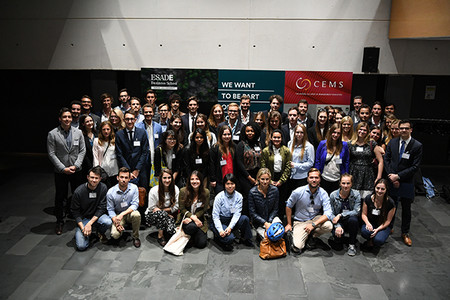150 CEMS Master in International Management students have gathered in Barcelona for unique two-day UN climate negotiations simulation
A two-day simulation of UN climate negotiations in Barcelona kicked off yesterday (14 May) in Barcelona, involving 150 young future business leaders from nine leading European Business schools (33 nationalities) – currently studying the CEMS Master in International Management. Students of the WiSo Faculty of the University of Cologne are participating, too.
During the opening afternoon yesterday, participating students, the CEMS student board and alumni association, launched a call to the wider CEMS community (31 leading business schools, 73 multinational companies and 7 social partners) urging broader action to be taken on the global climate challenge.
This year’s simulation was also kicked off by a high profile panel discussion, including representatives from multinational companies (CEMS corporate partners) and the Green Climate Fund (GCF), addressing what business schools can do to help solve the climate problem.
UN-backed simulation
During the simulation, the students are taking the roles of government, civil society and industry representatives from around the world. This unique educational initiative has the official backing of the United Nations Framework Convention on Climate Change(UNFCCC) and its Executive Secretary, Patricia Espinosa.
The annual Model UNFCCC, initiated in 2009 by the University of St. Gallen and ESADE in Barcelona, is now in its tenth edition and will take place one week after the official UN conference in Bonn. It consists of a semester-long course taught in parallel at all participating universities followed by the final negotiations in which all students come together at rotating locations.
The innovative simulation is an opportunity for CEMS Masters students to develop skills in dealing with one of the most urgent societal issues of our times, and to gain a deeper understanding of the role of business in contributing to global solutions for climate change.
Students must become essential part of the solution
Academic Director of the Model UNFCCC, Prof. Rolf Wüstenhagen, commented:
“It is crucial that young people are educated on the key elements of climate change – science, evolving policy and the role of business – so that they can become an essential part of the solution.
“Business education has a key role to play in developing a new generation of leaders who, in spite of turbulence on the international stage, can ensure rapid progress on addressing the global climate challenge.”
“The climate problem has been framed as mainly a global policy challenge, however it is clear that policy on its own cannot solve this problem. The business world can play an important role in leading the transformation towards a low-carbon world, because it has the capability and resources beyond anything else in society to innovate and develop new solutions.”
Participating CEMS partner schools are: University of St Gallen (Switzerland), ESADE Barcelona (Spain), University of Cologne (Germany), Corvinus University of Budapest (Hungary), WU Vienna (Austria), Rotterdam School of Management (The Netherlands), Bocconi University (Italy), Stockholm School of Economics (Sweden) and the Warsaw School of Economics (Poland).
CEMS is a global network of 31 academic members (leading business schools), 73 corporate partners (multinational companies) and 7 social partners (NGOs), dedicated to educating and preparing future generations of international business leaders, through the top ranked CEMS Master’s in International Management.
More information can be found at www.modelunfccc.org
